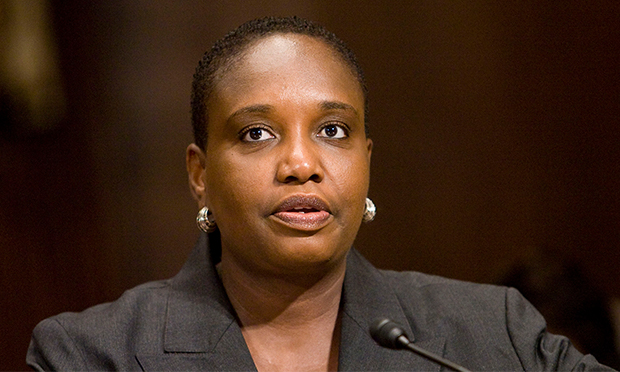Brooklyn Judge Denies Cardholders' Bid to Revive Class Action Suit
U.S. District Judge Margo Brodie's dismissal is a victory for the defendants including JPMorgan Chase & Co, which was represented by a Skadden, Arps, Slate, Meagher & Flom team led by partner Boris Bershteyn.
July 21, 2020 at 05:06 PM
3 minute read
The original version of this story was published on New York Law Journal
 U.S. District Judge Margo Brodie/courtesy photo
U.S. District Judge Margo Brodie/courtesy photo
U.S. District Judge Margo Brodie of the Eastern District of New York has denied a motion to set aside an earlier ruling in an antitrust class action suit, finding that a 2018 U.S. Supreme Court ruling changed decisional law but did not disturb the court's prior reasoning in the class action case.
Brodie's dismissal is a victory for the defendants, including JPMorgan Chase & Co., which was represented by a Skadden, Arps, Slate, Meagher & Flom team led by partner Boris Bershteyn.
The ruling comes after years of litigation in a sprawling multidistrict case related to credit charge interchange fees. In 2014, former U.S. District Judge John Gleeson dismissed the claims of lead plaintiff Marvin Salveson and other members of the cardholding class. The case was reassigned to Brodie soon after, and the U.S. Court of Appeals for the Second Circuit affirmed the dismissal.
After the Supreme Court issued its ruling in Ohio v. American Express in 2018, finding that payment card networks are "two-sided transaction platforms," Brodie invited the plaintiffs to brief whether they were entitled to relief in connection with the ruling.
Plaintiffs attorney Joseph Alioto of the California-based Alioto Law Firm argued that cardholders are direct purchasers of transaction products and therefore have standing to sue antitrust defendants. The 2014 judgment must be vacated, Alioto argued, because subsequent court decisions had established that cardholders and merchants are both direct purchasers in a two-sided market and should be treated alike.
Bershteyn argued that the American Express ruling did not prove that merchants and cardholders are alike; in contrast, he wrote, "cardholders benefit—not suffer—when interchange fees rise" and courts have found that the interchange fees are paid by one bank to another, not by cardholders.
He also argued that Ohio v. American Express, or Amex II, did not change the decisional law because the Second Circuit reached its decision in United States v. American Express, or Amex I, in 2016, while the Salveson appeal was pending before the circuit court.
"Simply put, there is no relevant change in the decisional law here because the holding of Amex II was already controlling in the Second Circuit when the Second Circuit last considered and rejected the claims of the Salveson plaintiffs," he wrote.
Brodie, in the decision dated July 15, found that the Second Circuit reached a different conclusion in Amex II than it reached in Amex I and that Amex II did change decisional law, but it ultimately had no bearing on the cardholder plaintiffs' standing.
"Because Plaintiffs still lack standing to sue under Section 4 of the Clayton Act, there is no basis for the Court to set aside its prior decisions," she wrote. "The Court therefore declines to address Plaintiffs' additional arguments as to why there are extraordinary circumstances present warranting vacatur of the judgment."
Alioto and a representative for Skadden did not respond to requests for comment.
READ MORE:
Circuit Upsets $7.5B Pact Between Merchants, Credit Cards
Opposing Counsel Join in Bid to Preserve $5.7B Credit Card Pact
This content has been archived. It is available through our partners, LexisNexis® and Bloomberg Law.
To view this content, please continue to their sites.
Not a Lexis Subscriber?
Subscribe Now
Not a Bloomberg Law Subscriber?
Subscribe Now
NOT FOR REPRINT
© 2025 ALM Global, LLC, All Rights Reserved. Request academic re-use from www.copyright.com. All other uses, submit a request to [email protected]. For more information visit Asset & Logo Licensing.
You Might Like
View All
Litigators of the Week: The Eighth Circuit Knocks Out a $564M Verdict Against BMO in Ponzi Case

Litigators of the Week: Second Circuit Tells Argentina to Turn Over More Than $300M to Bondholders

How One of the World's Largest Institutional Investors Approaches Litigation

Big Law and Litigation Finance Seem to Be Having a Moment
Law Firms Mentioned
Trending Stories
- 1Newsmakers: Former Pioneer Natural Resources Counsel Joins Bracewell’s Dallas Office
- 2Quiet Retirement Meets Resounding Win: Quinn Emanuel Name Partner Kathleen Sullivan's Vimeo Victory
- 3Avoiding the Great Gen AI Wrecking Ball: Ignore AI’s Transformative Power at Your Own Risk
- 4A Lesson on the Value of Good Neighbors Amid the Tragedy of the LA Fires
- 5Change Is Coming in the Trump Era. For Big Law, Change Is Already Here
Who Got The Work
J. Brugh Lower of Gibbons has entered an appearance for industrial equipment supplier Devco Corporation in a pending trademark infringement lawsuit. The suit, accusing the defendant of selling knock-off Graco products, was filed Dec. 18 in New Jersey District Court by Rivkin Radler on behalf of Graco Inc. and Graco Minnesota. The case, assigned to U.S. District Judge Zahid N. Quraishi, is 3:24-cv-11294, Graco Inc. et al v. Devco Corporation.
Who Got The Work
Rebecca Maller-Stein and Kent A. Yalowitz of Arnold & Porter Kaye Scholer have entered their appearances for Hanaco Venture Capital and its executives, Lior Prosor and David Frankel, in a pending securities lawsuit. The action, filed on Dec. 24 in New York Southern District Court by Zell, Aron & Co. on behalf of Goldeneye Advisors, accuses the defendants of negligently and fraudulently managing the plaintiff's $1 million investment. The case, assigned to U.S. District Judge Vernon S. Broderick, is 1:24-cv-09918, Goldeneye Advisors, LLC v. Hanaco Venture Capital, Ltd. et al.
Who Got The Work
Attorneys from A&O Shearman has stepped in as defense counsel for Toronto-Dominion Bank and other defendants in a pending securities class action. The suit, filed Dec. 11 in New York Southern District Court by Bleichmar Fonti & Auld, accuses the defendants of concealing the bank's 'pervasive' deficiencies in regards to its compliance with the Bank Secrecy Act and the quality of its anti-money laundering controls. The case, assigned to U.S. District Judge Arun Subramanian, is 1:24-cv-09445, Gonzalez v. The Toronto-Dominion Bank et al.
Who Got The Work
Crown Castle International, a Pennsylvania company providing shared communications infrastructure, has turned to Luke D. Wolf of Gordon Rees Scully Mansukhani to fend off a pending breach-of-contract lawsuit. The court action, filed Nov. 25 in Michigan Eastern District Court by Hooper Hathaway PC on behalf of The Town Residences LLC, accuses Crown Castle of failing to transfer approximately $30,000 in utility payments from T-Mobile in breach of a roof-top lease and assignment agreement. The case, assigned to U.S. District Judge Susan K. Declercq, is 2:24-cv-13131, The Town Residences LLC v. T-Mobile US, Inc. et al.
Who Got The Work
Wilfred P. Coronato and Daniel M. Schwartz of McCarter & English have stepped in as defense counsel to Electrolux Home Products Inc. in a pending product liability lawsuit. The court action, filed Nov. 26 in New York Eastern District Court by Poulos Lopiccolo PC and Nagel Rice LLP on behalf of David Stern, alleges that the defendant's refrigerators’ drawers and shelving repeatedly break and fall apart within months after purchase. The case, assigned to U.S. District Judge Joan M. Azrack, is 2:24-cv-08204, Stern v. Electrolux Home Products, Inc.
Featured Firms
Law Offices of Gary Martin Hays & Associates, P.C.
(470) 294-1674
Law Offices of Mark E. Salomone
(857) 444-6468
Smith & Hassler
(713) 739-1250






